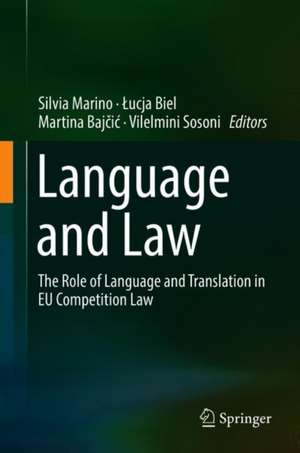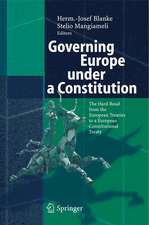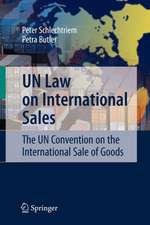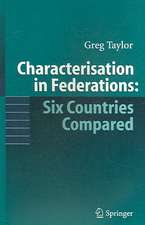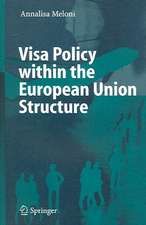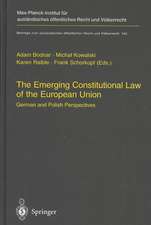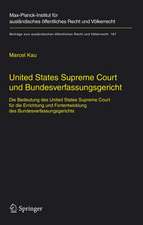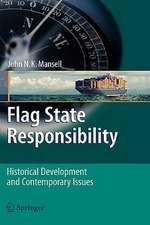Language and Law: The Role of Language and Translation in EU Competition Law
Editat de Silvia Marino, Łucja Biel, Martina Bajčić, Vilelmini Sosonien Limba Engleză Hardback – 8 noi 2018
The first part of the book focuses on the main developments in EU competition law in action, which includes legislation, case law and praxis. This part can be divided into two subparts: the private enforcement of EU competition law, and the cooperation among enforcers, i.e. the EU Commission, the national competition authorities and the national courts. Language is of paramount importance in the enforcement of EU competition law, and as such, the second part highlights legal linguistic skills, showcasing the advantages and the challenges of multilingualism, especially in the context of the predominant use of English as the EU drafting and vehicular language.
The volume brings together contributions prepared andpresented as part of the EU-funded research project “Training Action for Legal Practitioners: Linguistic Skills and Translation in EU Competition Law".
| Toate formatele și edițiile | Preț | Express |
|---|---|---|
| Paperback (1) | 1111.97 lei 6-8 săpt. | |
| Springer International Publishing – 8 feb 2019 | 1111.97 lei 6-8 săpt. | |
| Hardback (1) | 1118.13 lei 6-8 săpt. | |
| Springer International Publishing – 8 noi 2018 | 1118.13 lei 6-8 săpt. |
Preț: 1118.13 lei
Preț vechi: 1363.58 lei
-18% Nou
Puncte Express: 1677
Preț estimativ în valută:
213.97€ • 221.07$ • 177.99£
213.97€ • 221.07$ • 177.99£
Carte tipărită la comandă
Livrare economică 19 martie-02 aprilie
Preluare comenzi: 021 569.72.76
Specificații
ISBN-13: 9783319909042
ISBN-10: 3319909045
Pagini: 316
Ilustrații: VI, 376 p. 6 illus., 3 illus. in color.
Dimensiuni: 155 x 235 mm
Greutate: 0.71 kg
Ediția:1st ed. 2018
Editura: Springer International Publishing
Colecția Springer
Locul publicării:Cham, Switzerland
ISBN-10: 3319909045
Pagini: 316
Ilustrații: VI, 376 p. 6 illus., 3 illus. in color.
Dimensiuni: 155 x 235 mm
Greutate: 0.71 kg
Ediția:1st ed. 2018
Editura: Springer International Publishing
Colecția Springer
Locul publicării:Cham, Switzerland
Cuprins
Introduction: The Role of the Language in EU Law by Silvia Marino.- Part I – Public and Private Enforcement of EU Law in a Cooperative Perspective: On Economic Rationale of Competition Policy by Flavia Cortelezzi.- An Overview of the Recent Application of EU and National Competition Law by the Italian Competition Authority by Paolo Caprile.- The CJEU Case Law after Preliminary Ruling on Behalf of Private Enforcement of EU Competition Law by Maria del Mar Jimeno Bulnes.- The Direct Effect of EU Competition Law: From Regulation No 1/2003 to Directive 2014/104/EU by Marina San Martín-Calvo.- Jurisdiction and Applicable Law in Follow-on Actions by Paolo Bertoli.- Contemporary Trends in International Law in Relation to the Protection of Individuals from Multinationals’ Malpractice – Greek Competition Law after the Implementation of EU Directive 2014/104 by Sotirios S. Livas.- EU Competition Law in the Aftermath of Directive 2014/14 andits Implementation in the Republic of Croatia by Ana Pošćić.- EU Competition Law after Directive 2014/104/EU and its Implementation in Italy by Silvia Marino.- Part II – Linguistic Aspects of Drafting, Translating, Interpreting and Implementing EU Competition Law: Legal Languages in Contact: EU Legislative Drafting and its Consequences for Judicial Interpretation by Agnieszka Doczekalska.- Language and Translation in EU Competition Law: Insights from English, Greek, Italian and Spanish Versions of Legislative Texts by Vilelmini Sosoni.- A Mutual Learning Exercise in Terminology and Multilingual Law by Martina Bajčić and Adrijana Martinović.- Binomials in EU Competition Law by Katja Dobrić Basaneže.- Collocations of Terms in EU Competition Law: a Corpus Analysis of EU English Collocations by Łucja Biel, Agnieszka Biernacka, and Anna Jopek-Bosiacka.- The Glossary of EU English Competition Collocations and Terms by Łucja Biel, Agnieszka Biernacka, and Anna Jopek-Bosiacka.- Phraseological Profile of Judgments: Complex Prepositions in EU Competition Law Judgments by Dariusz Koźbiał.- Plain English and the EU: Still Trying to Fight the Fog? by Arianna Grasso.
Notă biografică
Prof. Silvia Marino, University of Insubria, Department of Law, Economics and Culture, Como, Italy
Assoc. Prof. Łucja Biel, University of Warsaw, Institute of Applied Linguistics, Warsaw, Poland
Assist. Prof. Martina Bajčić, University of Rijeka, Faculty of Law, Department of Foreign Languages, Rijeka, Croatia
Assoc. Prof. Vilelmini Sosoni, Ionian University, Department of Foreign Languages, Translation & Interpretation, Corfu, Greece
Assoc. Prof. Łucja Biel, University of Warsaw, Institute of Applied Linguistics, Warsaw, Poland
Assist. Prof. Martina Bajčić, University of Rijeka, Faculty of Law, Department of Foreign Languages, Rijeka, Croatia
Assoc. Prof. Vilelmini Sosoni, Ionian University, Department of Foreign Languages, Translation & Interpretation, Corfu, Greece
Textul de pe ultima copertă
The book provides an overview of EU competition law with a focus on the main developments in Italy, Spain, Greece, Poland and Croatia and offers an in-depth analysis of the role of language, translation and multilingualism in its implementation and interpretation.
The first part of the book focuses on the main developments in EU competition law in action, which includes legislation, case law and praxis. This part can be divided into two subparts: the private enforcement of EU competition law, and the cooperation among enforcers, i.e. the EU Commission, the national competition authorities and the national courts. Language is of paramount importance in the enforcement of EU competition law, and as such, the second part highlights legal linguistic skills, showcasing the advantages and the challenges of multilingualism, especially in the context of the predominant use of English as the EU drafting and vehicular language.
The volume brings together contributions prepared and presented as part of the EU-funded research project “Training Action for Legal Practitioners: Linguistic Skills and Translation in EU Competition Law".
The first part of the book focuses on the main developments in EU competition law in action, which includes legislation, case law and praxis. This part can be divided into two subparts: the private enforcement of EU competition law, and the cooperation among enforcers, i.e. the EU Commission, the national competition authorities and the national courts. Language is of paramount importance in the enforcement of EU competition law, and as such, the second part highlights legal linguistic skills, showcasing the advantages and the challenges of multilingualism, especially in the context of the predominant use of English as the EU drafting and vehicular language.
The volume brings together contributions prepared and presented as part of the EU-funded research project “Training Action for Legal Practitioners: Linguistic Skills and Translation in EU Competition Law".
Caracteristici
Includes contributions from both legal experts and linguistic experts Highly specialised: focuses in on a specific and highly technical field of EU Law Presents a highly practical approach, with a legal (private and public enforcement) and linguistic (with examples from the use of the language and the translation) analysis of cases
